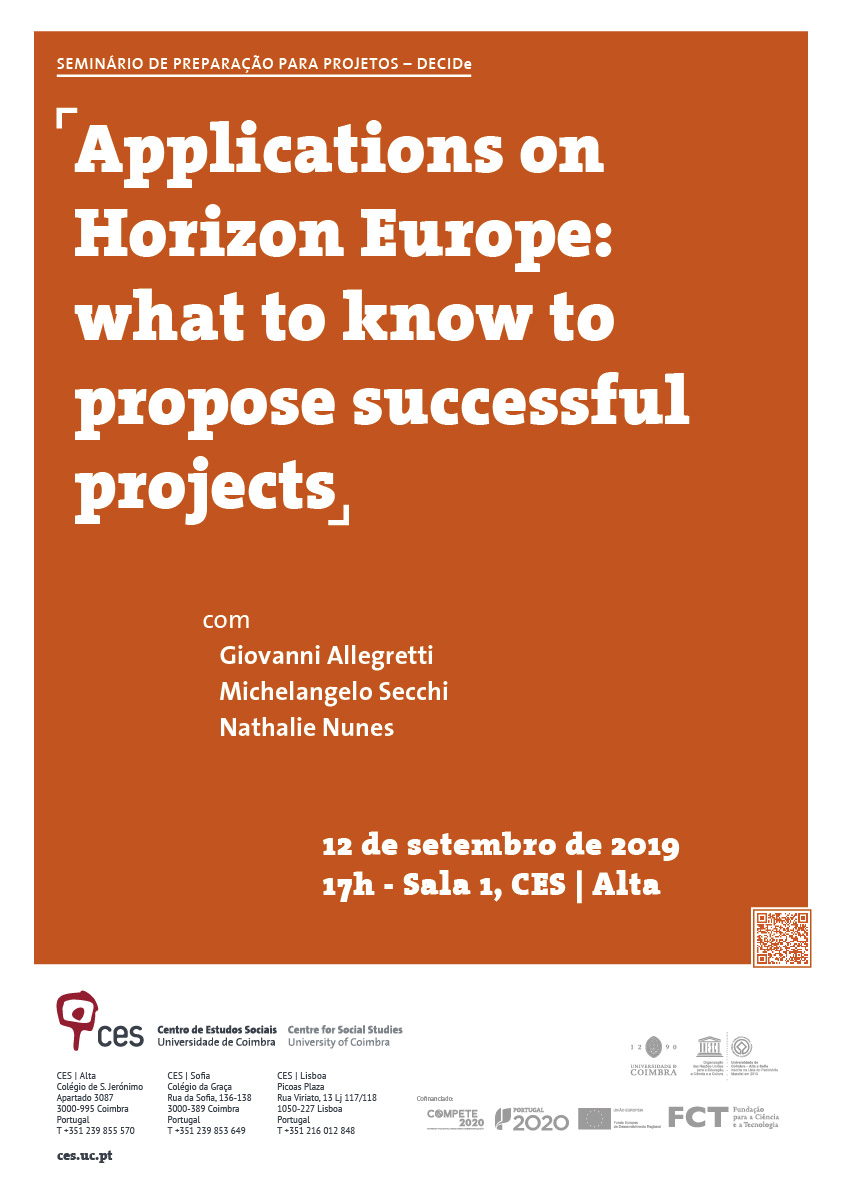Seminar
Applications on Horizon Europe: what to know to propose successful projects
Giovanni Allegretti
Michelangelo Secchi
Nathalie Nunes
12 de setembro de 2019
Room 1, CES | Alta
Overview
Having in mind the little time left for applications H2020 and the research and innovation programme that will succeed it, this seminar aims to share relevant information about some recent successful applications in order to stimulate additional applications, particularly within DECIDe’s Research Group. Besides encouraging new applications, this dialogue with members of some of these successful projects - such as URBiNAT (Healthy corridors as drivers of social housing neighbourhoods for the cocreation of social,environmental and marketable NBS) and PLUS (Platform Labour in Urban Spaces: Fairness, Welfare, Development) - counts for addressing some epistemological challenges and bureaucratic obstacles that researchers may find when proposing applications to Horizon Europe. Among the issues to be discussed are: usual difficulties and opportunities in regard to consortium agreements, different theoretical frameworks by partners, architecture of big projects, research teams, sharing of expertise within the project as well as the trade-off between research agendas and innovation goals. This seminar does not at all replace the support given by the project department but aims to be an additional space for discussion on Horizon Europe’s challenges and for sharing information among researchers especially regarding theoretical and epistemological concerns.
Nathalie Nunes is French and Portuguese, researcher at CES, and currently member of the co-coordination team of URBiNAT (H2020 project). She graduated in international and European law (University of Paris Nanterre, France), and holds a professional master's degree in international careers (University of Auvergne-Clermont 1, France), as well as a research master's degree in international and European law of fundamental rights (University of Nantes, France). PhD candidate in sociology of law at the University of Coimbra (Portugal), her thesis project is on the 2005 urban uprisings in the French suburbs. Nathalie first gained international experience in Cape Verde as a trainee for the French Embassy, and as a project assistant for UNICEF. Then in Brazil, from 2004 to 2010, where she worked in several sectors, namely a law firm, a communications agency specialised in sustainability, and NGOs. In both France and Brazil, she collaborated as a professional and a volunteer with organizations promoting and defending human rights, children's rights and the environment. From 2011 to 2015, she was also partner of an online communication agency. She most recently served as head of development at the International Federation for Human Rights (FIDH) in Paris (France).
Michelangelo Secci is member of the Plus Project - Platatform Labour in Urban Spaces: Fairness, Welfare, Development, funded by European Commission. With a background in History and Public Management, he has been working since 2003 as consultant on communication and stakeholder management for Governments, NGOs and Local Authorities. His consultancy areas are local development, democratic governance strategies, citizen engagement in policy making processes, and public sector accountability.
Giovanni Allegretti is an architect, planner and senior researcher at the Centre for Social Studies of the Coimbra University, Portugal. Here he is among the directors of the Ph.D "Democracy in the XXI century" and he coordinates the "PEOPLEs' Observatory: Participation, Innovation and Local Powers". He is a member of DECIDe Research Group. Since 2001, he has been assistant professor in Town Management at the University of Florence, where he got his Ph.D in Town, Territorial and Environmental Planning. Expert of the European Commission for the URBACT Programme, he deals with Participatory Budgets and Interactive Planning since 1998 Being the Principal Investigator in many projects connected with this issue, he coordinated the project "Empatia - Enabling Multichannel Participation Through ICT Adaptations". This time, he has coordinated the project "Plus - Platform Labour in Urban Spaces: Fairness, Welfare, Development", funded by European Commission.


